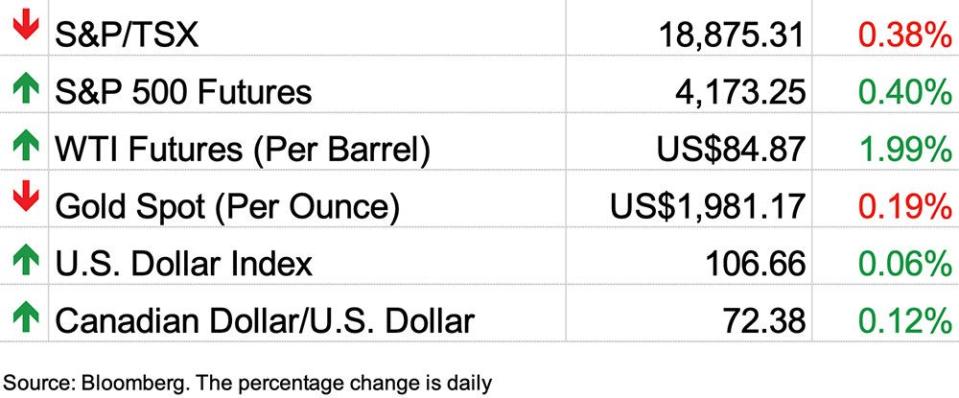Posthaste: Financial stress taking toll on Canadians' mental health, personal relationships


Financial stress is taking a serious toll on Canadians’ mental health and having a negative effect on their personal relationships, according to a new study by the Royal Bank of Canada.
The bank’s latest financial well-being survey of 1,001 people found that younger Canadians, in particular members of generation X (aged 43-58), millennials (aged 27-42) and generation Z (aged 18-26), are having more money problems than the national average.
The stress is causing them to lose sleep, with 53 per cent of millennials, 48 per cent of gen Z-ers and 43 per cent of gen X-ers admitting they are up at night worrying about money. That compares to 40 per cent of Canadians from all generations who say the same.
Deteriorating mental health is a direct result of all that financial stress and just under half, or 48 per cent, of all generations say their well-being is taking a hit. But that number jumps to 63 per cent among millennials and gen Z-ers, and 54 per cent for gen X-ers.
Money troubles are also bleeding into Canadians’ personal relationships. Millennials (59 per cent), gen Z (53 per cent) and gen X (47 per cent) report a “significant” amount of stress in their relationships compared with 43 per cent of all respondents.
Part of the problem is that many Canadians are struggling to make ends meet amid the rising cost of living, RBC said.
“We know personal well-being is closely tied to financial well-being, particularly for Canadians who are essentially living paycheque to paycheque or are uncertain about what the future holds,” Neil McLaughlin, group head of personal and commercial banking at RBC, said in a press release.
They are also more likely to lack financial confidence. Indeed, the study said three-quarters thought they’d be happier if they had more confidence in their financial future. That’s even more apparent among gen Z-ers (88 per cent), millennials (86 per cent) and gen X-ers (80 per cent).
“Many Canadians deal with a lack of confidence when it comes to understanding their finances, which affects their ability to make sound financial decisions,” McLaughlin said.
But that doesn’t mean finances aren’t on their minds. The study found that 30 per cent of Canadians think about their money a couple times every day. Millennials think the most about their finances (41 per cent), followed by gen Z-ers (34 per cent) and gen X-ers (31 per cent).
Still, all generations including gen Z (73 per cent), gen X (70 per cent) and millennials (69 per cent), believe their finances could improve if they spent more time on them.
Sign up here to get Posthaste delivered straight to your inbox.

The United States economy grew at the fastest pace in nearly two years last quarter on a burst of consumer spending, which will be tested in coming months. Gross domestic product accelerated to a 4.9 per cent annualized rate, more than double the second-quarter pace, according to the government’s preliminary estimate Thursday. The economy’s main growth engine — personal spending — jumped four per cent, also the most since 2021. — Bloomberg
Vancouver International Airport and Air Canada hold an event to mark Air Canada’s new non-stop service to Dubai International Airport. The first flight to DXB takes off on Oct. 28.
The Surrey Board of Trade will host the 7th Surrey Development Industry Forum. The conversation will centre on B.C.’s housing crisis and possible solutions to alleviate the challenges being faced.
Today’s data: Ottawa’s fiscal monitor; U.S. personal income and consumption; University of Michigan consumer sentiment index
Earnings: Imperial Oil Ltd., ExxonMobil Corp., Chevron Corp., Fortis Inc., Colgate-Palmolive Co.
Get all of today’s top breaking stories as they happen with the Financial Post’s live news blog, highlighting the business headlines you need to know at a glance.
Big grocers being cagey about their inflation-busting plans, but many are already in place
Tony Staffieri: Why the next frontier of connectivity is seamless
Banks are taking it on the chin, but here’s why they deserve a second look
Inflation, interest rates will have a surprising effect on your taxes next year
If you’ve never been hit by a curve ball big enough to force you to take a hard look at your financial habits, consider the current cost of living crisis as your warning. Debt counsellor Sandra Fry checks off some money habits that could allow you to break the cycle of feeling like you never have quite enough.
____________________________________________________
Today’s Posthaste was written by Noella Ovid, with additional reporting from The Canadian Press, Thomson Reuters and Bloomberg.
Have a story idea, pitch, embargoed report, or a suggestion for this newsletter? Email us at posthaste@postmedia.com, or hit reply to send us a note.
Listen to Down to Business for in-depth discussions and insights into the latest in Canadian business, available wherever you get your podcasts. Check out the latest episode below:

 Yahoo Finance
Yahoo Finance 





